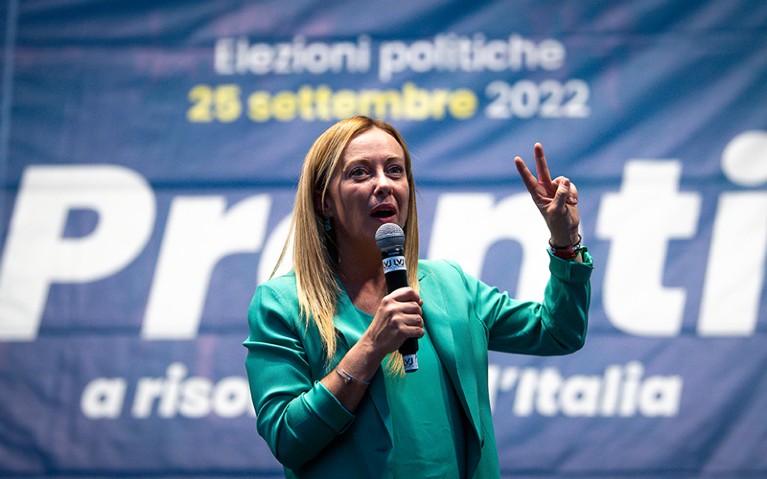
Giorgia Meloni is expected to become Italy’s next prime minister.Credit: Nicolò Campo/LightRocket/Getty
Last week’s general election in Italy resulted in a clear victory for the right-wing coalition, setting up far-right leader Giorgia Meloni to become the first female prime minister of a country where leading political figures have overwhelmingly been male.
But researchers have little hope that the new government will boost Italy’s underfunded research system. And some worry that issues such as climate change won’t get the attention they deserve.
“I don’t have high hopes for the foreseeable future,” says Federico Ronchetti, a physicist at the National Institute for Nuclear Physics in Frascati, who in 2020 launched a petition calling for Italy’s public investment in research to double.
Lockdown in Italy: personal stories of doing science during the COVID-19 quarantine
Science featured little in the electoral campaigns, including that of the winning coalition. “This doesn’t mean, however — or at least I hope so — that this absence will be reflected in the action of the government to come,” says senator-for-life Elena Cattaneo, a stem-cell scientist at the University of Milan.
However, as the right-wing coalition sets out to form a new government, no name has yet been suggested for leader of the Ministry of University and Research — Italy’s key research funding agency. That, Cattaneo says, is “a sign of the lack of interest” in science.
Meloni and her team did not respond to requests for comment from Nature.
Money problems
With spending on research and development standing at about 1.5% of gross domestic product (GDP), Italy lags behind the roughly 2.2% average of European Union countries. Most research funding comes from industry, with public investment accounting for only about 0.5% of Italy’s GDP. Some 14,000 Italian researchers left the country between 2008 and 2019 — a trend that can be partly explained by cuts to research budgets.
Some researchers now worry that under the new government, funding for public research will be slashed further. “Past right-wing governments have significantly cut spending for science,” says Mario Pianta, an economist at the Scuola Normale Superiore in Florence. And Meloni’s government, he says, will face extra challenges: Italy’s economy is being battered by high energy costs, a sudden burst of inflation and rising public debt. In this context, Pianta says, “research-spending cuts are easier to achieve politically than other public-spending cuts”.
Italy’s rise in research impact pinned on ‘citation doping’
The previous government, led by technocrat Mario Draghi, sought to use some of the pandemic-recovery funds from the European Union to help boost science in Italy. The investment plan allocated around €11 billion (US$11 billion) to research.
During her election campaign, Meloni said she intends to “update” that plan, amid rising prices exacerbated by the war in Ukraine. Now, researchers worry that part of the research budget could be shifted elsewhere — perhaps to ensure a stable energy supply or towards industries such as tourism.
Some are also concerned about Meloni’s attitude towards scientists. Although containment and social distancing have proved crucial to limiting transmission of COVID-19 and reducing hospitalizations, she this month criticized the restrictions introduced in Italy.
Climate concerns
Ahead of the elections, all the major Italian political parties, including Meloni’s Brothers of Italy, agreed to establish an advisory council to assess climate and environment matters and advise the new government.
But these issues don’t seem to be a top priority for Meloni’s party. In an independent analysis of the parties’ commitments to climate and the environment, Brothers of Italy ranked joint last. Its promises concerning practical responses to the climate crisis were “insufficient,” says Stefano Caserini, a climate scientist at the Polytechnic University of Milan who led the analysis. “The need to move away from fossil fuels wasn’t clear,” he adds.
Meloni’s election manifesto did mention incentives for agricultural innovation. Agricultural geneticists hope that genome-editing techniques, which can help to make plants resilient to diseases and changing environmental conditions, will be exempted from existing laws that have limited their use in Italy and eventually in Europe more widely. These techniques could make agriculture more productive and sustainable, says Enrico Pè, a plant geneticist at Sant’Anna School of Advanced Studies in Pisa. However, he says, Meloni’s plans don’t offer concrete proposals. “I’m not sure what to expect.”
A task force set up by the previous government developed a basic-research plan that recommended increasing public funding and changing how money is allocated by creating an agency that evaluates project proposals and “operates according to international standards”. So far, it’s unclear whether the new government will restructure the many agencies that evaluate universities and public research institutions, but Meloni has promised a ten-year research-funding strategy. This would be a welcome change, because science funding in Italy is erratic and tends to lack long-term planning, says Alberto Baccini, an economist at the University of Siena. But without increased funding, he adds, “long-term planning won’t make much of a difference”.



